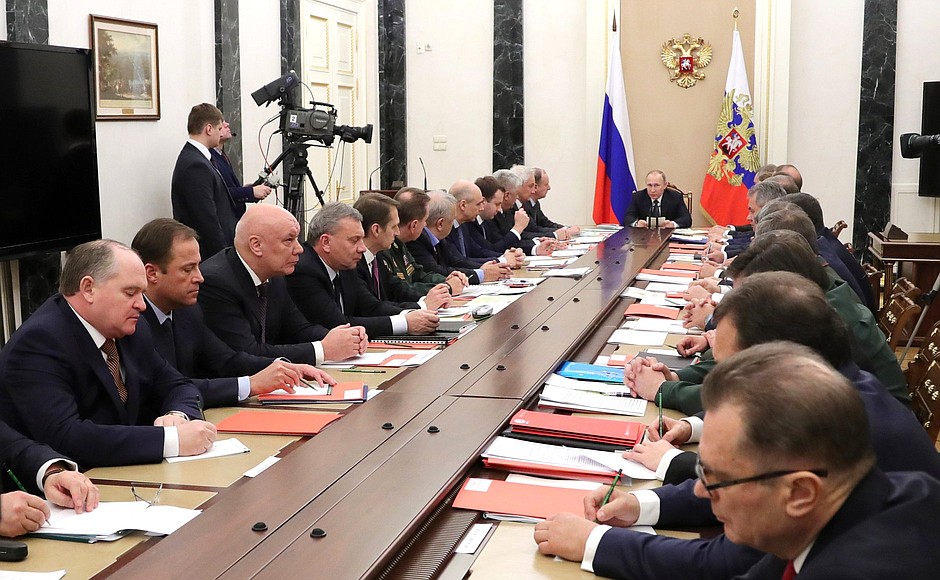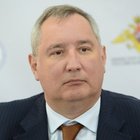
President of Russia Vladimir Putin: Good afternoon, colleagues. Today, we are holding the first Military-Industrial Commission meeting in 2017.
To begin, I will say a few words about implementation of the state defence order in 2016 in terms of production of armaments, military and special equipment. Last year, the state defence order was fulfilled better than in previous years, and here are the numbers: it was 93 percent complete in 2013, 96.7 percent in 2014, already 97.6 percent in 2015, and 98.8 percent last year. That’s a good number. I would like to thank the ministries, departments, and the military-industrial complex employees, as well as the military-industrial complex board for their coordinated and responsible work and decisive contribution to re-equipping the Armed Forces and strengthening national defence capabilities.
A new state armaments programme through 2025 is being developed. Under it, the Army and the Navy should have at least 70 percent of the latest equipment by 2020.
The fulfilment of this task requires the steady, stable and consistent operation of the entire military-industrial complex. The equipment that is provided to troops should fully meet quality and reliability requirements. In addition, contractor enterprises should ensure steady supplies to the military.
Today we will discuss the main areas of general-purpose force development. This is related to long-term plans – through 2025 and beyond.
Alongside the Air Force and the Navy, the Ground Forces of course play a very important role in possible armed conflicts, and our task is to provide them with the best weapons and modern equipment and significantly increase their combat capability. A key indicator of the effectiveness of the Ground Forces is their mobility, their readiness for redeployment across long distances and on short notice. It is necessary to enhance the rapidity of these operations and increase the speed of the redeployment of units and large combined contingents.
Providing general-purpose forces with modern means of communication remains a pressing task. We have repeatedly talked about this in different formats. A lot has already been done, but experience shows that not all problems here have been resolved yet.
Autonomous robotic equipment is another important and promising area. It has the potential to drastically change the entire armament system of general-purpose forces, and we need our own effective development projects in this sphere as well.
To reiterate, all the work to strengthen the general-purpose forces should be built on a clear understanding of potential conflicts and the general trends in the development of the armed forces at home and abroad. I would like to stress once again that we should thoroughly analyse the experience in the use of arms and equipment, including in combat conditions, both in this country and in other countries, paying special attention to the organisation and quality of maintenance under these conditions.
And of course, it is necessary to do the science and technology groundwork for a new armament programme. Last year, we discussed plans to create the Council of Chief Designers for General Purpose Forces. I would like to ask you to report on the results of this work and how the Council’s work will be organised.
Now let’s get to work.
Mr Rogozin has the floor. Go ahead, please.
Deputy Prime Minister, Chairman of the Military-Industrial Commission and Chairman of the Commission Board Dmitry Rogozin: Thank you.
Mr President,
Last year, the Military-Industrial Commission Board, together with the Defence Ministry, Ministry of Industry and Trade, and the Russian National Guard, completed work to establish this council. A list of 27 projects has been approved that will enable us to develop new models, and general-purpose weapon systems. The industrial organisations in charge have been approved and the chief designers for each project appointed. Yesterday, a Military-Industrial Commission Board meeting approved the council’s leadership.
This will ensure balanced development of general purpose ground forces, scientific justification of decisions taken, expert evaluation of projects, evaluation of defence industry enterprises’ readiness in terms of technology and equipment, and also military, research and science and technology support for work carried out over the period through to 2035.
Mr President, I would like now to move on to the items on the agenda that we will discuss behind closed doors.
Vladimir Putin: Please, go ahead.
<…>
